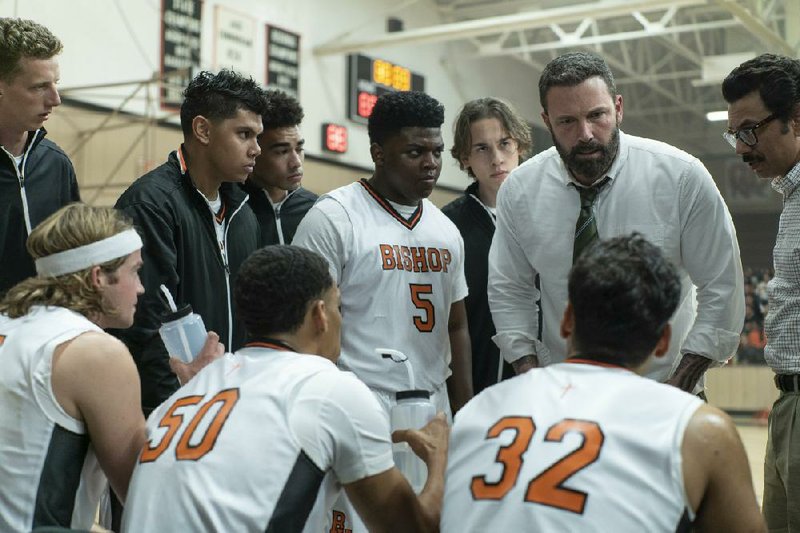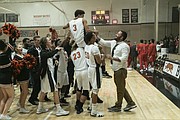Pardon me as I fail to avoid falling into The Way Back's most obvious narrative tar pit: Ben Affleck, an admitted alcoholic whose drinking contributed mightily, he maintains, to the dissolution of his marriage to actress Jennifer Garner, and still fighting the battle for his sobriety, playing a character whose drinking has cost him his marriage, trying to reclaim himself via a basketball coaching gig at his old high school, where he was once a star player.
If it feels a bit too on-the-nose, Affleck working out his demons publically via the accouterments of his stardom, the film never tries to hide its intentions, but it also doesn't shy away from the more gruesome and ugly elements of the disease.
The Way Back
87 Cast: Ben Affleck, Al Madrigal, Janina Gavankar, Michaela Watkins, Brandon Wilson, Will Ropp, Hayes MacArthur, Fernando Luis Vega, Charles Lott Jr., Melvin Gregg, Glynn Turman
Director: Gavin O’Connor
Rating: R, for language throughout including some sexual references
Running time: 1 hour, 48 minutes
What it decidedly -- and blessedly! -- is not, is exactly what it appears to be from the outside: A melodrama in which the framework of a well-worn sports analog (his character's sobriety echoing the rise of his down-on-its-luck hardscrabble team) is draped over everything such that the team's victory becomes an echo of his own rebirth.
Well, let's say it's not just that, and it doesn't sync everything up in a too neat, prepackaged bundle either. Director Gavin O'Connor's previous body of work includes the U.S. hockey team re-enactment Miracle, and the surprisingly effective underground fight-club flick Warrior, so it's not as if he's unaware of the standard sports film trajectory, but rather than make a film that cheapens the alcoholic struggle with a cheesy metaphor, the film focuses instead on the messiness of the alcoholic himself. His journey, and redemption, are largely his own.
We begin with Affleck's character, Jack Cunningham, at one of his lowest ebbs. Living in a seedy apartment a short run from his favorite dive bar, Jack works construction by day and emotional deconstruction by night, drinking himself insoluble, assisted home by a kindly gent who knew his father back in the day. Separated from his wife (Janina Gavankar), and running blindly from a tragedy in their past, Jack is caught in a downward spiral from which no one, including his concerned sister (Michaela Watkins), can seem to extricate him.
Enter his old Catholic high school, who come calling when their existing coach has a heart attack and is forced to resign. With no great players, and few players -- and spectators -- period, Jack is forced to tough-love his team into giving a damn, and in the process of getting them on the right track, he also has to hold himself accountable in the process. Before long, the team is winning games en route to making a playoff run for the first time in the 21st century, and Jack is steering clear of his bar altogether.
Naturally, this feel-good center can't hold -- at least that cleanly -- and Jack is plunged back into the throes of his disease just as the team is peaking. It is here where things turn a bit more interesting, a little less formulaic, at least in the sense of the well-worn nature of these things.
Mind you, the film, written by Brad Ingelsby, still has its unnecessary dramatic flourishes. For all its nuanced details -- Jack methodically moving his beers from the fridge to the freezer before downing them as he talks himself into and out of taking the job -- there are still the obligatory reasons why he is so miserable and messed up in the first place, a process that never fails to have the opposite effect of its intention.
The scene particularly highlighted in a recent New York Times feature on Affleck is the one that feels most closely autobiographical, in which Jack, finally in rehab, breaks down in front of his ex-wife and apologizes for disappointing her and failing as a husband. Tears streaming down his face, you get the sense that the scene was Affleck's raison d'etre for making the film in the first place -- apologizing for his weaknesses, and admitting his culpability. It is intense, deeply personal and heartfelt, almost unnerving to see his vulnerabilities laid so bare.
If Affleck has a particularly notable quality as an actor, it's his discomfort playing characters he doesn't believe in -- a big reason why he's one of the worst superhero leads in history. In those roles, his affect emanates embarrassment, like watching your dad try to pretend he's thrilled with a birthday present he clearly can't stand. But here, playing a role that feels tailored to his own personal anguish, it's clear that he's all-in, and the result is his best performance in years.
It's not for anyone else to say if the making of this film actually gave him a cathartic sense of peace, an absolution to his ongoing guilt and pain. But one can hope, and here, offering his audience a peek inside the chaotic torment of the disease, the way it destroys your life faster than you can rebuild it if you're not extremely self-aware, he gives us someone, at last, with whom we can root for, not despite his frailties, but because of them.
MovieStyle on 03/06/2020

